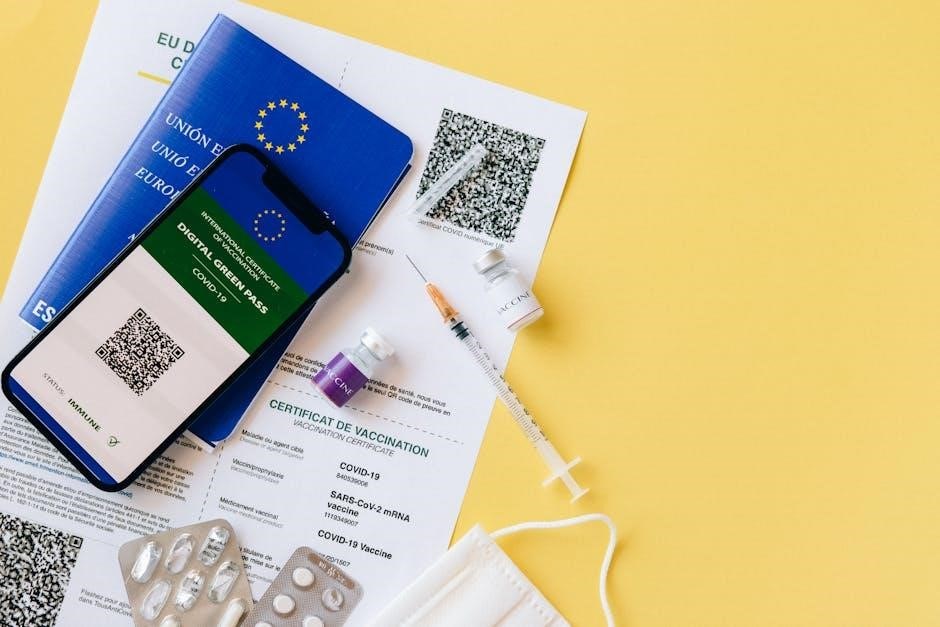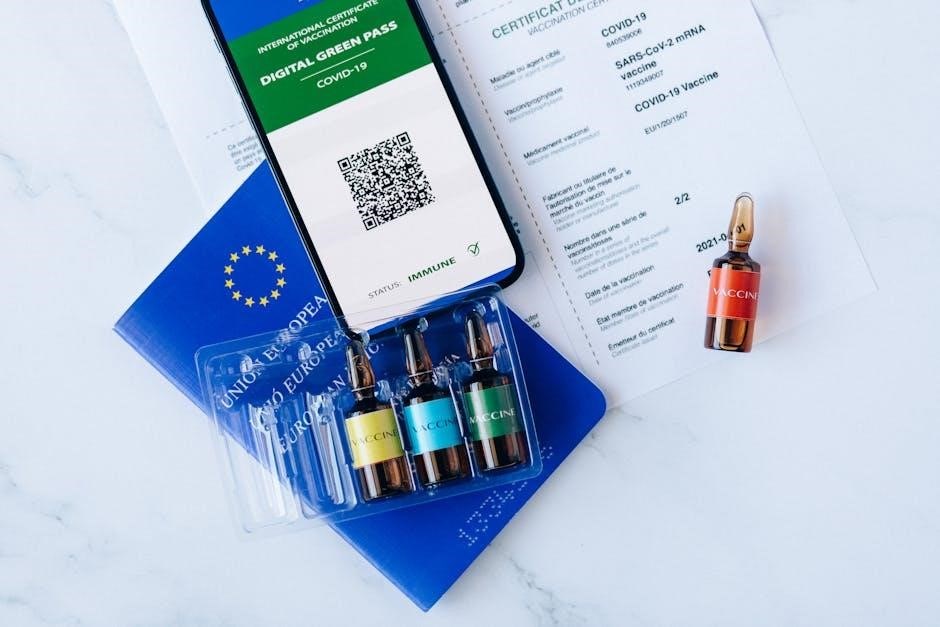Welcome to the guide on 8 and 16-hour security certificates in NYC. These certifications are essential for aspiring security professionals, offering free training and job placement assistance.
1.1 Overview of 8 and 16 Hour Security Certificates
The 8 and 16 hour security certificates are essential for aspiring security professionals in NYC. The 8-hour course is designed for new applicants, covering foundational topics like security law and ethics. The 16-hour certification builds on this, offering advanced training in areas like first aid, fire safety, and emergency procedures. Both programs are free in NYC and include job placement assistance, making them a valuable pathway to a career in security. Completion of these certifications is required for employment as a security guard in the city.
1.2 Importance of Security Training in New York City
Security training in NYC is crucial for maintaining public safety and ensuring professionalism in the security industry. The 8 and 16-hour certifications equip guards with essential skills like emergency response, legal compliance, and conflict resolution. These programs prepare individuals to handle diverse scenarios effectively, making them indispensable for safeguarding businesses and communities across New York City. Proper training ensures a safer environment for everyone.

Eligibility Requirements for Security Certificates
Eligibility for security certificates in NYC requires a valid NYS Pistol Permit, security guard registration, and passing criminal background checks. Legal requirements must be met;
2.1 Basic Requirements for Enrolling in Security Training
To enroll in security training, applicants must provide a valid government-issued ID, Social Security card, and proof of NYC residency. A high school diploma or equivalent is required. Applicants must be at least 18 years old and pass a criminal background check. Additional legal requirements, such as a valid NYS Pistol Permit, may apply for advanced courses like the 47-Hour Firearms Training.
2.2 Criminal Background Checks and Legal Requirements
Applicants must undergo a criminal background check through the Division of Criminal Justice Services (DCJS). A clean record is typically required, though minor offenses may be reviewed. Legal requirements include completing mandatory training hours and adhering to DCJS guidelines. Applicants must disclose any criminal history and provide necessary documentation. Failure to comply with these legal standards may result in enrollment denial or certification revocation.

Differentiating Between 8 and 16 Hour Certificates
The 8-hour certificate focuses on pre-assignment training, while the 16-hour program offers advanced modules. Both are essential for security roles in NYC, catering to different career stages.
3.1 Purpose and Scope of the 8 Hour Pre-Assignment Training
The 8-hour pre-assignment training provides foundational knowledge for new security guards in NYC. It covers legal powers, emergency procedures, and communication skills. This course is mandatory for all new hires and sets the stage for advanced training. Participants learn essential duties, ethical conduct, and safety protocols. Successful completion is required to work as a security guard in New York State.
3.2 Advanced Training Covered in the 16 Hour Certification
The 16-hour certification builds on the 8-hour course, offering in-depth training for security guards. It covers advanced topics like conflict resolution, legal responsibilities, and specialized security procedures. This program is designed for those seeking to enhance their skills and professionalism. Completion of this training is required for full certification, ensuring guards are well-prepared to handle complex security situations effectively in New York City.

How to Enroll in Free Security Training in NYC
NYC offers free 8 and 16-hour security training programs. Reputable providers include MetroCards and job placement assistance. Enroll through approved institutions for certification and career opportunities.
4.1 Finding Reputable Training Providers in New York City
To find reputable training providers in NYC, look for institutions approved by the Division of Criminal Justice Services (DCJS). Many organizations offer free 8 and 16-hour certification programs, often with additional benefits like MetroCards and job placement assistance. Verify the provider’s credentials and check for reviews to ensure quality training. Ensure they meet state requirements for security certification in New York.
4.2 Application Process and Required Documentation
The application process for free security training in NYC typically requires basic documentation, such as a valid state ID and Social Security card. Some providers may assist with fingerprinting and application submission. Ensure all paperwork is completed accurately to avoid delays. Training providers often guide applicants through the process, making it straightforward to enroll in 8 or 16-hour certification programs.

Course Content and Structure
The 8-hour certification covers foundational topics like security roles, ethics, and emergency procedures, while the 16-hour program delves into legal aspects, first aid, and specialized training areas.
5.1 Key Topics Covered in the 8 Hour Certification Course
The 8-hour certification course covers essential topics such as the roles and responsibilities of security guards, legal aspects of security, emergency procedures, and communication skills. Students learn about ethics, diversity awareness, and conflict resolution. The course also includes practical exercises to ensure understanding of security protocols and procedures. Additionally, it emphasizes the importance of maintaining public safety and professional conduct while on duty.
5.2 Detailed Curriculum for the 16 Hour Certification Program
The 16-hour certification program builds on the 8-hour course, offering advanced training in security protocols, risk assessment, and incident response. Topics include legal authorities, use of force, and first aid. The curriculum also covers surveillance techniques, terrorism awareness, and fire safety. Practical exercises and scenario-based training are emphasized to equip students with real-world skills, ensuring they are fully prepared for security roles in NYC.

Job Placement Assistance After Certification
Many training providers in NYC offer job placement assistance upon certification completion. This includes resume building, interview preparation, and connections with security employers. Some even provide MetroCards for commuting.
6.1 Job Opportunities for Certified Security Guards in NYC
Certified security guards in NYC have access to diverse job opportunities across sectors like retail, corporate, healthcare, and government. Positions include unarmed and armed security roles, with higher pay for those completing the 16-hour advanced training. Many employers require these certifications, making them essential for career advancement in the security industry. Opportunities are abundant, ensuring steady employment prospects.
6.2 Role of Training Providers in Facilitating Employment
Training providers play a crucial role in connecting graduates with potential employers. Many offer job placement assistance, including resume building, interview preparation, and job fairs. Some providers partner with security companies to ensure placement. Additionally, free MetroCards are often provided to help graduates commute to interviews. These efforts significantly enhance employability, making training programs a valuable pathway to a successful security career in NYC.

Maintaining and Renewing Your Security Certificate
Renewing your security certificate in NYC involves completing continuing education requirements and adhering to DCJS guidelines. Regular updates ensure compliance with evolving security standards and regulations.
7.1 Renewal Process for Security Certificates in NYC
The renewal process for security certificates in NYC involves completing continuing education courses approved by the DCJS. Security professionals must finish 8 hours of training every year. This includes updates on laws, emergency procedures, and ethical standards. Renewal applications must be submitted online, with required fees and documentation. Staying compliant ensures active certification and employment eligibility in the security industry.
7.2 Continuous Training Requirements for Security Professionals
Security professionals in NYC must complete 8 hours of continuing education annually, as mandated by the DCJS. These courses cover updated laws, emergency response protocols, and ethical practices. Training ensures professionals stay informed and compliant with industry standards. Continuous education is crucial for maintaining certification and staying effective in their roles. It also enhances career growth and adaptability in the evolving security landscape.

Additional Resources for Security Training
Explore free study materials and online courses to supplement your training. Join professional security associations for networking, updates, and exclusive resources to enhance your career in security.
8.1 Free Study Materials and Online Courses
Access free study materials and online courses to prepare for your 8 and 16-hour security certificate exams. NYC offers free resources, including guides and practice exams, to help you succeed. Online platforms provide comprehensive courses, covering essential topics like security protocols and emergency response. Take advantage of these tools to enhance your knowledge and ensure you’re well-prepared for your certification exams and future career in security.
8.2 Benefits of Joining Professional Security Associations
Joining professional security associations offers numerous benefits, including networking opportunities with industry experts and access to exclusive resources. These organizations often provide updated training materials, job placement assistance, and insights into industry trends. Members gain access to workshops, webinars, and certifications, enhancing their professional development. Associations also advocate for improved workplace standards and legal protections, ensuring members stay informed and competitive in the security field.

The Role of DCJS in Security Training
The Division of Criminal Justice Services (DCJS) oversees security training in NYC, ensuring compliance with state laws and regulations. It provides guidelines for training providers, approves curricula, and monitors certification processes to maintain high standards. DCJS also supports training providers by offering lesson plans and resources for the 8-hour pre-assignment and 16-hour certification programs.
9.1 Overview of the Division of Criminal Justice Services (DCJS)
The Division of Criminal Justice Services (DCJS) is a New York State agency that oversees public safety and criminal justice initiatives. It plays a crucial role in regulating security training programs, including the 8 and 16-hour certification courses. DCJS ensures compliance with state laws, approves training curricula, and sets standards for security professionals. It also provides resources and guidelines for training providers to maintain program integrity and effectiveness.
9.2 DCJS Guidelines for Security Training Providers
DCJS establishes strict guidelines for security training providers to ensure high-quality instruction. Providers must obtain DCJS approval for their training programs, including the 8 and 16-hour certifications. Instructors must meet specific qualifications, and courses must cover mandated topics. Additionally, providers are required to maintain accurate records of student attendance and performance. Adherence to these guidelines ensures that security professionals meet state standards and are adequately prepared for their roles.
Common Mistakes to Avoid During Training
Common mistakes include incomplete applications, missing documentation, and poor time management. Ensure all requirements are met and engage actively with course materials to succeed.
10.1 Pitfalls in the Application and Enrollment Process
Common pitfalls include submitting incomplete applications, missing deadlines, and providing incorrect documentation. Ensure all forms are filled accurately and required documents, like ID and background checks, are included. Double-check submission deadlines to avoid delays. Additionally, verify the credibility of training providers to ensure compliance with DCJS standards. Proper preparation prevents enrollment issues and ensures smooth processing.
10.2 Tips for Successful Completion of the Training Program
To successfully complete the training program, attend all sessions, engage actively, and review course materials. Set aside dedicated study time for exams and practicals. Utilize free study resources and seek clarification on complex topics. Staying organized and maintaining consistent effort ensures mastery of the curriculum and timely certification. Active participation and thorough preparation are key to achieving your security certification goals effectively.
Pursuing an 8 or 16-hour security certificate in NYC offers a gateway to a rewarding career. With free training and job placement assistance, it’s an ideal path for aspiring professionals seeking growth and stability in the security industry.
11.1 Final Thoughts on Pursuing a Security Certificate in NYC
Obtaining an 8 or 16-hour security certificate in NYC is a valuable asset for launching a career in security. With free training options and job placement assistance, it’s an accessible path to professional growth. The structured approach ensures comprehensive knowledge and skills, making you job-ready. Continuous learning and certificate renewal further enhance your expertise. This certification opens doors to diverse opportunities, making it a wise investment in your future.